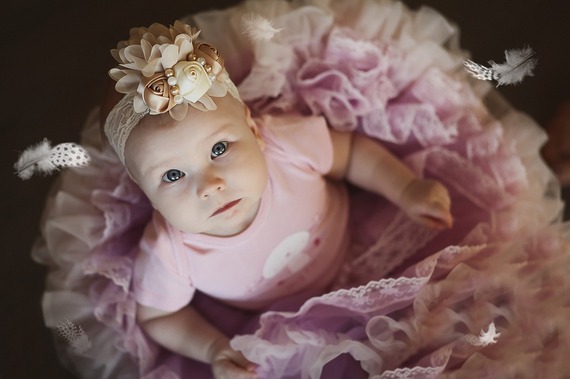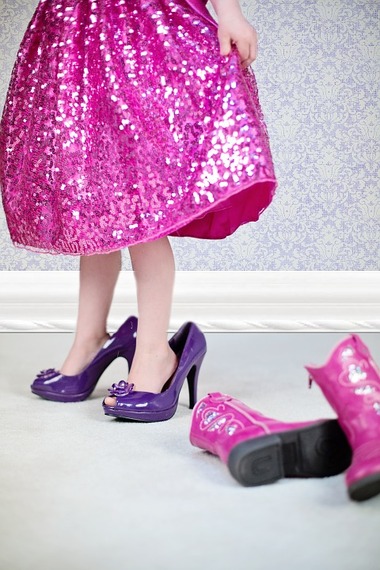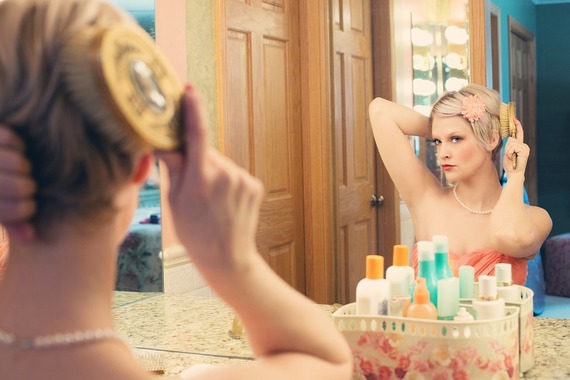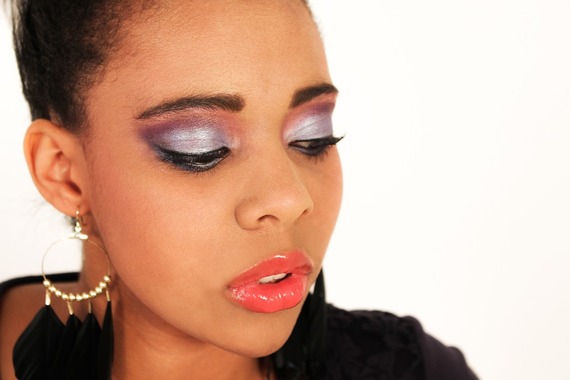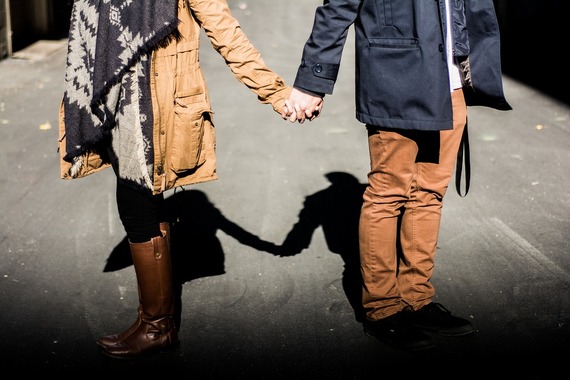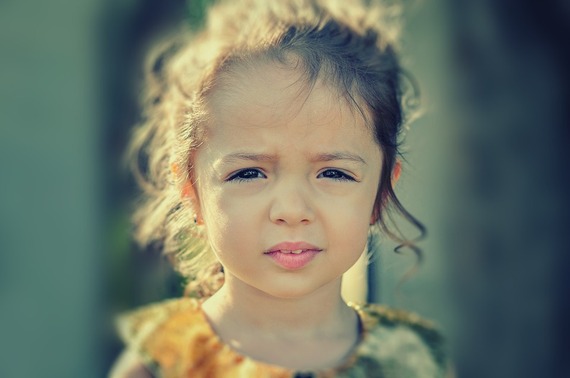Let's be honest. When it comes to navigating the obstacle course that is women's equality in modern society, it's a minefield out there.
We can fully recognize the leaps and bounds that have already been made. Women can now do things like vote, and ride astride horses instead of using a sidesaddle, and veto corsets and bustles in favor of sneakers and sweatpants. There's no denying that advancements have been made.
But one thing is also clear: we are not there yet.
People will tell you we are. Groups like meninists and anti-feminists and men's rights activists and misogynists as a whole will talk until they're blue in the face about how there's no need for modern feminism, because we've already won equality. The battle is over, they insist -- but those hysterical women's libbers keep right on fighting.
How very, very wrong they are. It is not over. It is so far from over, we've only made a dent.
Reinforcing Physical Differences in Early Childhood
Men's bodies and women's bodies are different; everyone knows this. They're shaped differently and have different parts. However, aside from those obvious variations -- genitalia, breasts versus a smooth chest, and distribution of fat, muscle and body hair, to name a few -- we are intrinsically the same. Beneath the gender-defining parts, we're all just flesh and bone.
Why is it, then, that women's bodies are the ones that are so inherently sexualized?
We don't realize it when we're young, but the marginalization of our bodies purely as orchestrators of sex and reproduction begins at a very early age. I don't remember the specific moment in which I was taught that my chest was something that needed to be hidden away. I was probably too young to ask why -- but if I had, the answer would have sounded something like, "Because girls are different than boys." At that age, we certainly all looked the same from the waist up, but who would I be to argue? I was a little kid; I accepted what I was taught. The same way my parents did, and their parents did...
So from a very young age, little girls are conditioned to feel ashamed of our bodies. We must hide them away; as though they are a dirty secret. It's inappropriate to talk about them to anyone else. In fact, best to pretend they're not there at all.
For a while, that feels normal. It's what we're indoctrinated into, after all. Meanwhile, the boys run around the park bare-chested. We don't notice; not in any way that would point to an injustice that might be taking place. Things are simply the way they are.
Introducing Gender Roles
Grown-ups hand us dolls to play with so we can pretend to be mothers -- as though that should be our sole aim in life. As though that's what we're here to do. I am not in any way attempting to undermine the role of mothers -- parenting is one of the most important duties anyone can take on, and it's the hardest job in the world. But parenthood -- motherhood -- is a choice. It's a path we don't all have to take and many of us will ultimately choose not to.
But no one tells us that -- they just give us the dolls and the plastic food and the toy kitchen, a rehearsal for our pre-destined role as reproducer, inadvertently setting the stage for feelings of selfishness and inadequacy when, years down the road, we question whether parenthood is the right choice for us. They give us princess dresses with sparkles and oooh and aaah at how pretty we are, now that we're outfitted to a certain standard of beauty -- as though being pretty is the highest honor, the crowning achievement of a girl's life.
Granted, this isn't all we experience. Many of us are lucky enough to have a support system of parents and teachers alike who will encourage us, help foster our interests, and tell us we can be whatever we want to be when we grow up. Just like boys, many of us will form a fairly solid sense of self based on that support and encouragement.
The difference is that for the vast majority of the boys, that support will remain at face value. But for the girls, it extends into the duties we've been destined to fulfill since birth -- have babies and be pretty. The two facets of ourselves become so interwoven that eventually, we can't tell one from the other, and they both become an intrinsic part of us that will generally remain with us for the rest of our lives.
You see, for us girls, there's always a "but." Boys are told they can be race car drivers or fighter pilots, and the sentence ends there. Some of us girls are also told we can be race car drivers or fighter pilots -- but there's always a condition. You can be a race car driver -- but you won't be as pretty as you are in a tiara. You can be a fighter pilot -- but that's not what the other girls do. There's always a sacrifice to be made; there are always strings attached.
Body Anxiety in Adolescence
We grow older. We start developing breasts, growing pubic hair, having our periods. We are suddenly very, very aware of our changing bodies -- and in our self-centric adolescent minds, so is everyone around us. We feel ashamed. We cross our arms in front of our breasts to keep attention away from them -- because we have already been indoctrinated to accept the notion that they are intrinsically lewd and sexually suggestive, and therefore must be kept out of view. Many of us will occasionally feel dirty and crude just because of their mere presence on our chests.
Almost every single one of us feels some sort of anxiety about the shape of our bodies. Every day, we are bombarded with images of the way the female body should look. As the ultimate importance of attractiveness has been drilled into our heads practically from birth, we stare despairingly at our own bodies in the mirror, hating them for what they are and wishing upon everything we hold dear to just look different. Thinner, curvier, taller, shorter, prettier...better.
An alarming amount of us internalize this despair so deeply that we fully believe our self-worth is dictated by it. We fully believe we are not good enough as we are; that we are somehow flawed or incorrect, just by looking like ourselves.
And sadly, most of us accept this as the norm; the status quo. It's just how the world is, we rationalize. Attractiveness is everything. It's natural.
The Sexualization of the Female Body
Meanwhile, most of the boys aren't feeling this kind of pressure to look a very specific way. They deal with the basic peer pressure that has them wanting the trendiest haircut or a certain "it" brand of shoes -- and that's a normal part of social growth and development. Maybe they get picked on for being scrawny or overweight. But, as males, what they won't have to deal with are the constant messages, all around them, that the thing that matters most about them are their bodies.
They will hear about men in the media. Men who have triumphed in sports or who have run Fortune 500 companies or who have received recognition as an actor or musician. The accomplishments of these men will be highlighted on television, in magazines and on billboards -- and there is a good chance that none of those advertisements will hone in on these men's bodies. We most likely won't see a zoomed-in photograph of a male CEO's cellulite (yes, men can get it, too), or hear musings on whether or not the latest action movie hero lost all that weight due to an eating disorder. While it's true that their physical attributes may be mentioned, the underlying meaning behind these men -- their intrinsic worth as human beings -- will not be tied in to the diameter of their thighs.
For the girls, however, it's an entirely different experience altogether. TV commercials tell us we need more radiant skin, more lustrous hair, a flatter belly, a tinier waist. We are bombarded with advertisements from cosmetics companies, all designed to send the message that we are not pretty enough in our natural state. We watch as the female body is scrutinized, sexualized, and objectified by just about every aspect of mainstream media. We see these bodies used to sell every product from clothing to jewelry to fast food hamburgers.
We learn that if that female body is exposed, the context is almost always sexual in nature, reinforcing society's opinion that the female is an inherently sexual creature and adding more layers to our deep wells of shame. To use just one example, in 2013, Heidi Klum managed to save her son and their nanny from drowning in a riptide on a Hawaiian beach. The next day, headlines about the event read, "Heidi Klum Suffers Nip Slip While Rescuing Son And Nanny From Drowning." That's right -- in the midst of all the life-saving, one of her breasts slipped free of her bikini top, and suddenly that became all that mattered. Things like this teach us, from a young age, that it doesn't matter what we achieve or what awards we win or whose life we save -- everyone will still just be scrutinizing our physical forms, because that's really what's valuable about us.
The Fine Line Between "Pretty" and "Asking For It"
Is it any wonder, then, that most of us girls go through life with confusing love-hate relationships with our bodies, in which they are simultaneously allies and enemies? Is it any wonder that, due to the hyper-sexualization of the female body in the media, so many of us learn to feel inappropriate or lewd if we are not "properly" covered? I remember so many instances of this in my adolescence; I'd get a new skirt and wear it to school, only to be sent into a blind panic midway through the day because surely I was showing too much of my legs and everyone would think I was trashy and just looking for attention.
Is it any wonder that we place so much emphasis on physical attractiveness, when so many of the compliments an adolescent girl receives are centered around how pretty she is and how desirable she looks? Most of us don't notice how harmful those statements can be until many years down the road. Looking back, I can remember how it felt to be called "pretty" -- it was literally the best thing anyone could have said to me. Everything else -- "you're so smart," or "you have a great sense of humor," or, "great volleyball game today, you really played well" -- paled in comparison, every time.
Because to a lot of us, what we accomplished academically, socially, or athletically simply didn't matter if we weren't pretty. "Pretty" was the be-all and end-all -- the foundation upon which all other achievements were built upon.
So the struggle to be conventionally attractive then met the struggle to not be too attractive, lest we bring unwanted attention upon ourselves. Because the message we received from society was, undoubtedly, that looking a certain way meant we were asking for trouble.
We were told people would think we were "easy" or "trashy" if we wore short skirts or heavy makeup. We were told it was our responsibility to not get sexually assaulted, rather than the responsibility of men not to sexually assault us. Depending on the value systems of the families who raised us, some of us were told it was our duty as women to remain "pure," because sexual activity would somehow decrease our worth as people. We were instilled with a deep and powerful sense of guilt if we dared to explore our sexuality -- a guilt that, for many women, has carried over even into adulthood.
Misogyny In The Workplace
We finished our schooling and entered the workforce. We got jobs in restaurants and faced fairly regular sexual harassment from customers and coworkers alike (the food service industry has been shown to have a startlingly high incidence of harassment). We got jobs in an office environment and sat through meetings in which our suggestions weren't taken seriously until they were repeated by a man. We worked in male dominated industries and were constantly and consistently undermined by our colleagues - perhaps even passed up for prominent positions in favor of a man, regardless of the fact that we had better credentials. When our male co-workers displayed confidence, they were "headstrong" and "driven" -- but when we did the same, we were labeled as "bitchy," "bossy," and "over-emotional."
We put up with questions about when we'd start having children - and if we'd chosen not to do so, we were met with sanctimonious frowns and condescending platitudes of, "You'll change your mind someday." Our desire to focus on career rather than family was criticized; people took it to mean that we were too cold, unfeeling, aggressive, or - god forbid - ambitious. Or, if we did express a desire to start a family someday, colleagues then raised the question of how dedicated we actually were to our careers. Either way, the scrutiny was there, and it was relentless.
Misogyny In Relationships
We dated; we met men who thought of us as property, men who told us what we should eat and how we should dress, and men who seemed like "nice guys" until they faced rejection, in which case they began threatening us, simply because we didn't feel a spark. One in four of us got involved with men who physically hurt us -- and if we chose to disclose this information, some of us were told to be tolerant of it, because that's just the nature of men.
One in five of us was sexually assaulted -- and for those of us who were, less than half reported it. We remembered the lessons from our early adolescence, you see -- the era in which we learned that we are far more likely to be blamed for our own assaults because of the clothes we were wearing or the amount of alcohol we'd consumed. Rather than face all the shame, humiliation and scrutiny to press charges that would very likely not end in a conviction anyway -- only about 3 percent of rape cases that go to trial actually end in the rapist serving any jail time -- we kept quiet, internalized more shame and fear, and quietly tried to get on with our lives.
And at some point, we began to realize just how fucked up all of this stuff actually is.
A Legacy of Equality
Is it any wonder, then, that we are angry? The "angry feminist killjoy" is a tired rhetoric, used mainly by misogynistic men who refuse to acknowledge their own privilege in society -- but in truth, many of us are angry.
We have a right to be.
Looked at on a large scale, it seems insurmountable -- it's an overwhelming epidemic in our society. And I am fully convinced that, on some level, misogyny will always exist. We will never entirely purge it from our world, as much as that saddens me.
However, there are things we can do -- things that begin at the very birth of our daughters and our sons, our nieces and our nephews, our godchildren and our stepchildren. The mind of a child is elastic, capable of receiving so much information -- and misogyny is a learned behavior. So is the indifference or blindness to it, and the willingness to accept it as the status quo.
So let's counteract it by teaching empowering things instead. Let's teach unlimited possibilities instead of gender roles. Let's tell our daughters and our nieces and all the young girls we know that they are smart and strong and fierce, rather than focusing on their physical attributes. Let's show our sons and our nephews and our friends' sons, through example, that women are just as powerful and valid in society as men are, and that everyone deserves respect, regardless of gender.
Because I truly believe that we can do so much better - and that future generations deserve to live in a world in which the playing field is level for everyone.
